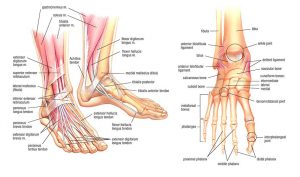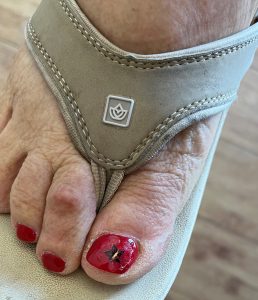
Home to 26 bones, 30 joints and more than 100 muscles, tendons and ligaments, your feet are the foundation of your body.
One of the most important things elderly people – indeed anyone – can do is to properly care for their feet. Made for walking, running, jumping, and carrying the weight of our bodies, healthy feet help older adults maintain mobility and balance.
Why is footcare important?
Our feet are miraculous. Not only do they help us get from one place to another, our feet can provide an early warning system to potential health conditions, from gout to diabetes. How?
The human body works as an integrated system. This means that when one body part is working optimally – others will often follow. Conversely, improper function can have a negative impact on the rest of the body.
Years of wear and tear can be hard on your feet. Natural changes like flattening and widening, overuse, shoes that don’t fit properly, and even genetics can lead to injuries and disorders of the foot that impact quality of life. In addition to being painful, some of these changes may increase your risk of falling.
Common Challenges Of Foot Self-Care
 Foot care is self-care. However, research tells us that the ability to care for feet can be hindered by several factors:
Foot care is self-care. However, research tells us that the ability to care for feet can be hindered by several factors:
- Vision – out of sight, out of mind. Not being able to see well means that foot care is sometimes forgotten.
- Neuropathy – can reduce feeling in the feet, which might hide many medical conditions.
- Reduced flexibility – prevents the ability of proper toenail trimming, and foot cleaning.
To keep aging feet healthy and reduce the risk of negative outcomes indirectly caused by foot problems, use these 8 essential senior foot care tips. If a senior is unable to properly attend to their own feet, consider recruiting a caretaker or loved one to help.
Tips for Maintaining Healthy Feet!
Keeping an eye on your feet can provide an early warning about serious health problems such as diabetes, arthritis, nerve damage and poor blood circulation. Adopt these preventive measures today!
1. Always wear shoes and socks
- Your footwear is a big contributor to foot health, so ensure your shoes are properly fitted, neither too loose nor too tight. Otherwise, they can rub and cause blisters and other foot ailments as well as impair mobility.
- Avoid wearing heels higher than 1 inch and find close-toe shoes that are comfortable and support your arch type, foot width, and ankle strength.
- Wear thick, soft cotton or wool socks to protect and cushion your feet.
- Socks also help keep your feet dry. Wear a clean pair every day. Avoid socks with ridges or an elastic top; they can irritate or restrict circulation.
2. Good circulation makes for happy feet
-

Dana McQuillan, Director of Care, Cataraqui Heights, Walk for Alzheimer’s To increase circulation, prevent cramps and keep your muscles in good shape, try to walk every day (hint: to help you sleep better, do it in the morning!).
- Put your feet up when sitting.
- Stretching and strengthening your feet is also critical when it comes to avoiding pain and injury.
- While sitting, pick up marbles or a towel with your toes.
- While sitting, alternate pointing your toes toward your nose with pointing your toes downward; rotate your ankles in circles, first in one direction, then the other. Spend some time wiggling your toes.
- Don’t cross your legs for long periods of time.
- Don’t smoke, it narrows the arteries and can hamper blood flow.
3. Wash feet daily
- Wash your feet in warm water every day.
- Be sure to clean between your toes.
- Dry your feet and between the toes well.
4. Keep the skin soft and smooth
- If your heels are already dry, consider using a pumice stone lightly.
- Use an unscented, occlusive cream on the tops and bottoms of your feet if the skin is dry and cracked.
- Wipe off excess cream and don’t apply between your toes.
- Beware of falls! Put on socks and shoes before standing up.
- Use talcum powder if your feet sweat a lot.
5. Check your feet regularly
- Examine your feet and toes every day for cuts, blisters, red spots, bruises, and swelling.
- Use a mirror to check the bottoms of your feet or ask someone to help you.
- Check for temperature differences between feet.
- If you have diabetes, consult regularly with your health care team to keep your blood sugar within a healthy range.
6. Don’t forget your toenails
-

Pedicure fun at River Ridge! Cut or file your nails regularly with appropriate nail care tools.
- Trim them straight across and never shorter than the end of your toe.
7. Avoid Foot Sores
- For older adults who spend a lot of time sitting, resting their feet on a surface like a pillow, footstool, or mattress continuously can result in pressure and skin irritation that leads to tissue breakdown.
- Prevent this type of potentially dangerous condition by “floating the heels” — propping the ankles up so the feet rest suspended in the air without touching anything.
8. When to See Your Doctor
If you notice any of the following, speak to your doctor:
- an injury that doesn’t heal or becomes infected
- any part of your foot or leg that turns blue or black
- pain when walking that is relieved by rest
- reduced sensation to pain or extreme temperatures
- any unusual coldness, cramping, numbness, tingling or discomfort in your feet
To find a doctor who cares for feet, look under Podiatrist or Chiropodist in the Yellow pages or on-line.
May is Foot Health Awareness Month in Canada
All Seniors Care in-house nurses , like those in our senior homes in Ottawa, regularly teach Healthy Living Workshops, educating residents about topics like the importance of foot care. Making this information easy to understand and access improves the quality of life for older adults. The workshops also help build relationships with new residents, which makes them more likely to ask questions or let the staff know if they need help.
If you are a senior or caring for one, find out how we prioritize the health and wellbeing of older adults in our independent senior apartments or memory care in Ottawa by exploring our web site. If you are looking for assisted living communities in Winnipeg, Sturgeon Creek’s knowledgeable, and compassionate staff provide a superior level of care and attention to all our residents’ needs, day or night.
Writer – Julianna McLeod
Julianna is a health and wellness expert at All Seniors Care. Her mission is to create content that empowers seniors to form sustainable solutions for lasting health and happiness. She is an experienced writer, editor, and Recreational Therapist living in Toronto.